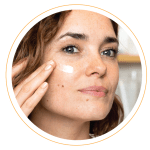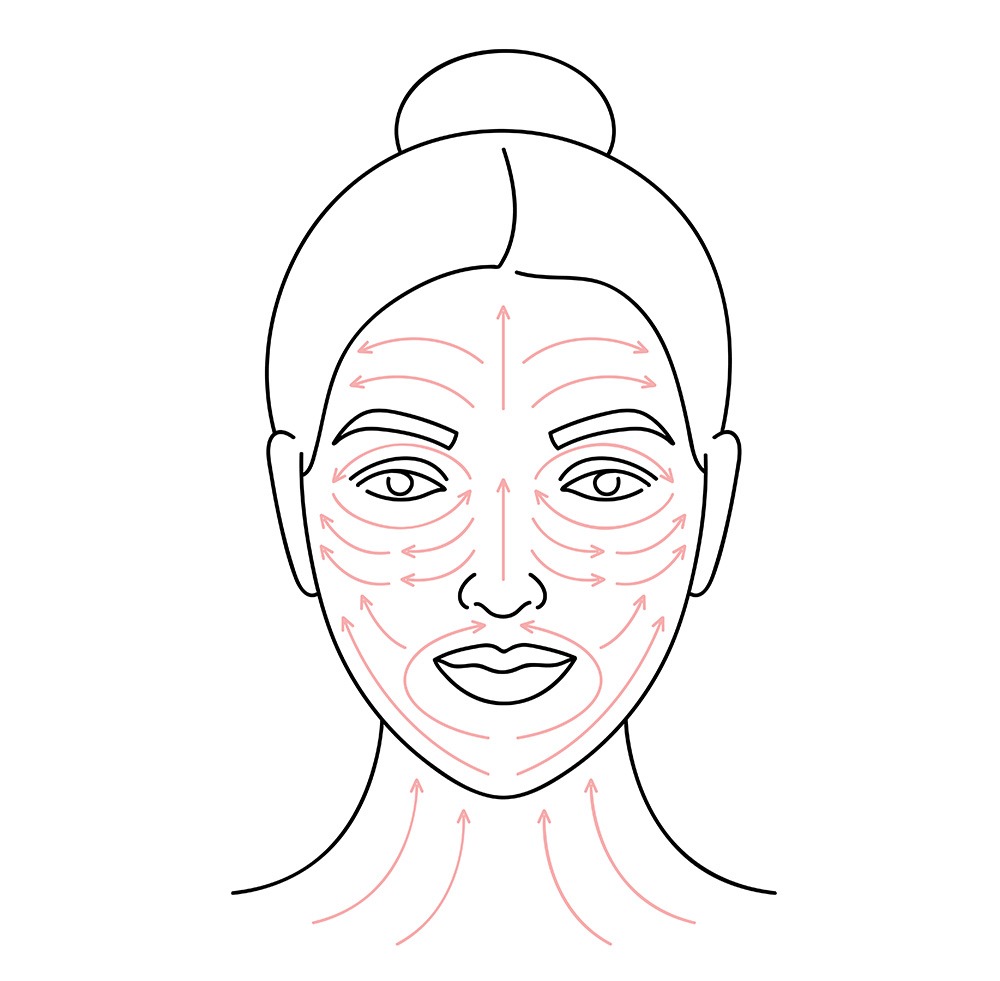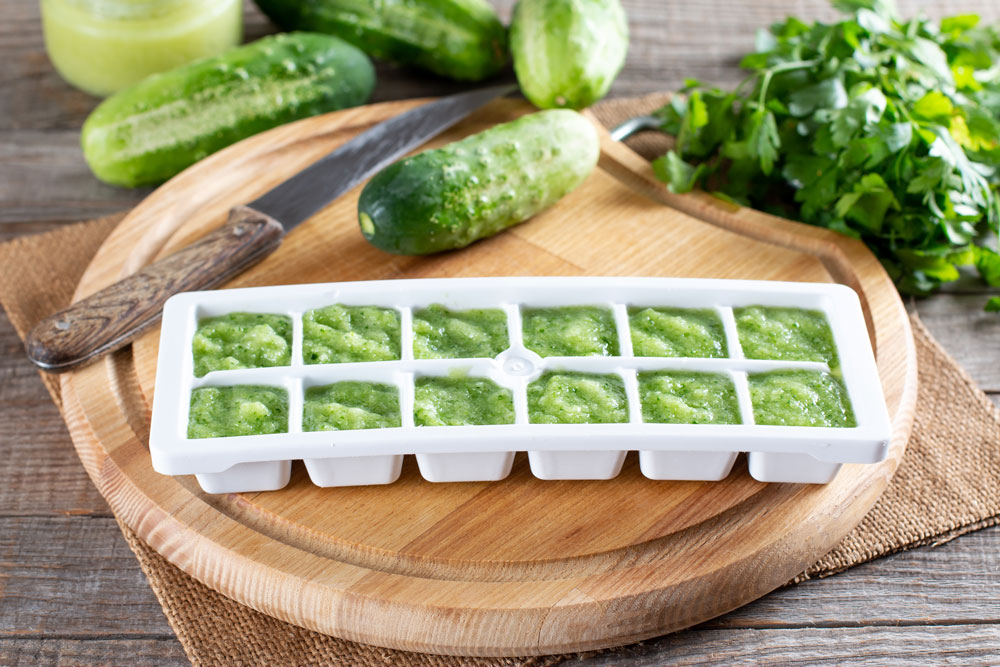Glow Big or Go Home Antioxidant Packed Smoothie
This smoothie not only contains an astounding amount of some of the best whole food sources of antioxidants but tastes like a decadent dessert. (Go on, have it for breakfast, we won’t judge).
My name is Liz, and I created your optimized skincare routine and plan. I focused on your high and medium priorities based on your DNA test. I also considered your Yudoyu quiz results which told us about your skin type and feelings about your skin. Your personalized routine includes products packed with ingredients that, with consistent use, will improve current skin quality and protect your future face. Please add lifestyle and dietary changes (outlined below) for an added boost toward happier, healthier skin!
Warmly,
Liz and The Yudoyu Team
We are here to help if you have any questions! Email us at hello@yudoyu.com.M

Combination + Sensitive + Under 40
DNA ANALYSIS EXPLANATIONS
Our lab tests 16 core and dozens of secondary genetic markers that contribute to skin protection and premature aging and can play a big role in your skin’s future well-being.
The genes tested are cataloged according to their structural, functional, and metabolic effects on the skin.
Each Skin DNA category provides 1 of 3 outcomes: High Risk, Medium or Low Risk.
How does your skin compare with the rest of the population?
Yudoyu’s partner lab SkinDNA® has established one of the world’s largest derma genetics databases with more than 2 million DNA profiles*.
Our data allows us to discover distinctive skin traits shared between groups of people.
Gene performance is rated as either normal, impaired, or deficient. Remember, your DNA is only a part of your skin equation, and we can help you on YOUR path to healthier, happier skin.
You produce close to normal collagen levels to counteract the breakdown process.
COLLAGEN BREAKDOWN: Impaired – You may break down collagen faster than it is produced and be prone to skin laxity and looseness.
COLLAGEN PROTECTION: Normal – Your body produces the antioxidant responsible for protecting collagen at an optimal level.
Your body has a reduced ability to break down glucose. Excess glucose has been linked to several age-related traits, including wrinkles.
WRINKLE FACTOR: Deficient – You have a minimal ability to break down glucose efficiently. Excess glucose molecules stick to collagen and elastin, binding fibers together, leading to wrinkles, thinning skin, and structural skin damage.

Your body’s ability to protect your skin from the sun is near optimal. However, sunbathing every day or not taking care while outdoors can ultimately increase your lifestyle risk of sun damage, UV damage, and pigmentation issues.
GENES TESTED:
MELANIN 1: Impaired – Your body is prone to some irregular melanin production, causing sensitivity to sunlight.
MELANIN 2: Normal – You tend to tan. However, prolonged exposure can still cause sensitivity, freckling & pigmentation with minimal sunburning symptoms.
PHOTO DEFENSE: Normal – Your body is near optimal at defending against UVB rays. The “Burning Rays” are responsible for sunburns and pigment responses.
UV RADIATION REPAIR: Impaired – Your result suggests you may not adequately repair DNA damage caused by UVA radiation exposure (known as the “Aging” Rays).
UV RADICAL REPAIR: Impaired – You have less than optimal ability to break down UV Radicals produced by sun exposure. This gene is crucial for maintaining the skin’s overall health by aiding the body in repairing UV radical damage.
You have a near-optimal ability to produce essential antioxidants. Your results also suggest that you are unlikely to be sensitive to Environmental Pollutants.
GENES TESTED:
ANTIOXIDANT PRODUCTION: Impaired – You produce ONE of TWO crucial antioxidants optimally. The benefits of having at least optimal crucial antioxidants still help you efficiently break down free radicals and prevent unnecessary damage to skin cells.
POLLUTION DEFENSE: Normal – Your genes can efficiently break down pollutants that can break down the skin’s cellular wall, such as car exhaust, carbon, and smoke.
Your body may be producing an oversupply of inflammatory proteins. Your results indicate that this oversupply may likely cause rashes, redness, or irritation. You may also be more prone to chemical sensitivity issues from exposure to pollution, perfumes, and highly active products.
GENES TESTED:
INFLAMMATION: Impaired – Your body may occasionally over-respond to perceived threats, irritating skin cells and causing itching, redness, skin sensitivity, hay fever, or other allergies.
DETOX: Normal – Your body can break down xenobiotic compounds such as cigarette smoke, exhaust fumes, air pollution, and alcohol.
DETOX: Impaired – Your body does not break down xenobiotic compounds such as cigarette smoke, exhaust fumes, air pollution, and alcohol as well as it should. Variations in this gene can create internal inflammation, causing redness, rashes, and acne.
SKIN SENSITIVITY: Impaired – You may be moderately sensitive to skin contact from perfumed products, active skincare ingredients, and general city pollution. Spot-test products with active ingredients to make sure you can tolerate the ingredients.
…based on your results.**
Want to start smaller? Look for the * next to “add to cart” for your best beginner products.
Remember to use a broad-spectrum SPF daily (rain or shine). You’ll find more great choices and add-ons in your “just for YU shop.”
Here is your personalized skincare plan based on your results!**
Add these easy-to-do lifestyle habits to your daily routine.
Look for these topical ingredients when shopping for skincare.
Please consult your doctor before you begin a new dietary plan.
These minimally-invasive professional treatments will benefit your skin’s texture and make you glow!
Want to dig deeper? Learn about the causes and symptoms of poor skin health, and view our comprehensive list of beneficial ingredients and advice.
Selected for you!
 Lymphatic drainage is a facial massage to boost the body’s natural draining system. The face is left visibly more lifted, firm, and youthful by assisting in the movement of excess toxins, water, fats, and proteins down the lymph vessels and into the nodes!
Lymphatic drainage is a facial massage to boost the body’s natural draining system. The face is left visibly more lifted, firm, and youthful by assisting in the movement of excess toxins, water, fats, and proteins down the lymph vessels and into the nodes!
Step 1: Apply treatment oil or cleansing balm of choice. Fingers should not drag but glide easily over the skin with little to no resistance.
Step 2: Follow the directional guide demonstrated in the illustration. Using light pressure, gently massage the face upwards and outwardly. Pressure should be not unlike moving a pen across a table. The key is to lift and relax muscles! If redness occurs, lighten the pressure.
Step 3: Finish with a glass of water, herbal tea, or warm broth for added hydration.
What if I’m doing this wrong?
If you are working in upward and outward motions with light, relaxing amounts of pressure, you are certain to fight against one of the main causes of wrinkles – gravity.

Ice Cubes: Freeze some slices of cucumber, or make your own custom spa water cubes with green tea, whole-leaf aloe juice, and cucumber. Once frozen, glides cubes across the face, focusing on any especially irritated or red areas of the face.
Facial Rollers: (store in the freezer or plunge in ice water before using) Face rolling can stimulate your lymphatic system and blood flow.
Gua Sha: This traditional Chinese healing technique incorporates scraping, rubbing, and massaging motions to improve circulation and lymphatic drainage giving a lifted look to the skin. Try storing your gua sha tools in the fridge or plunging in ice water before using them for more anti-inflammatory benefits.
Red Light / Light Therapy: Red light therapy, specifically, has the potential to assist in helping blemishes, reducing inflammation, decreasing healing time after certain procedures, and general skin rejuvenation.
Facial Steamers: Steaming can make skin look firmer because it increases circulation. This boost of blood flow nourishes the skin and delivers oxygen, resulting in a natural, healthy glow. It releases acne-causing bacteria and cells.
** This advice is intended for education and aesthetic purposes only. If you have undiagnosed inflammation or blemishes that won’t heal, please consult a medical doctor. If you have been diagnosed with acne, rosacea, eczema, or another skin disease, please check with your healthcare provider before changing your skincare plan.
This smoothie not only contains an astounding amount of some of the best whole food sources of antioxidants but tastes like a decadent dessert. (Go on, have it for breakfast, we won’t judge).
Here is one of our favorite shortcuts to having both bone broth and soup, without having to make both separately. Did we also mention how delicious it is?
Roasted bell peppers and tomatoes are two of the top ten foods highest in Vitamin C, making this hummus a super-charged source and convenient snack for any time!
This firming, nourishing, best-thing-since-sliced-bread recipe is not only delicious, but easy to make, and extremely affordable.
† Watch for the symbol: These products and ingredients may contain high amounts of iodine. See the iodine warning below before using.
Thyroid Disease Warnings: If you, or someone in your family, are prone to or suspect you might have thyroid disease, we recommend avoiding the use of all of the following ingredients in both skincare and supplements unless otherwise instructed by your healthcare provider:
These ingredients are enormously high in iodine content, a proven, major thyroid disruptor. When applied topically, they can enter the bloodstream.
Resources: https://www.drchristianson.com/the-iodine-controversy/